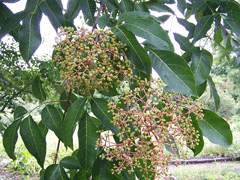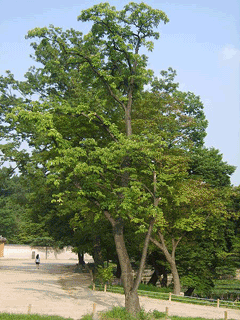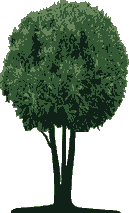 |
|
http://commons.wikimedia.org/wiki/User:Selso |
 |
| http://commons.wikimedia.org/wiki/User:Dalgial |
Translate this page:
Summary
Physical Characteristics

 Tetradium is a deciduous Tree growing to 15 m (49ft 3in).
Tetradium is a deciduous Tree growing to 15 m (49ft 3in).
See above for USDA hardiness. It is hardy to UK zone 10. It is in flower in June. The species is hermaphrodite (has both male and female organs).
Suitable for: light (sandy), medium (loamy) and heavy (clay) soils. Suitable pH: mildly acid, neutral and basic (mildly alkaline) soils. It can grow in semi-shade (light woodland) or no shade. It prefers moist soil.
UK Hardiness Map
US Hardiness Map
Synonyms
Tetradium daniellii. Xanthoxylum daniellii.
Plant Habitats
Edible Uses
An edible oil is obtained from the fruit. Used for cooking[105, 177, 183].
References More on Edible Uses
Medicinal Uses
Plants For A Future can not take any responsibility for any adverse effects from the use of plants. Always seek advice from a professional before using a plant medicinally.
One report says that the plant has medicinal qualities, no further details are given[174].
References More on Medicinal Uses
The Bookshop: Edible Plant Books
Our Latest books on Perennial Plants For Food Forests and Permaculture Gardens in paperback or digital formats.

Edible Tropical Plants
Food Forest Plants for Hotter Conditions: 250+ Plants For Tropical Food Forests & Permaculture Gardens.
More

Edible Temperate Plants
Plants for Your Food Forest: 500 Plants for Temperate Food Forests & Permaculture Gardens.
More

More Books
PFAF have eight books available in paperback and digital formats. Browse the shop for more information.
Shop Now
Other Uses
The oil from the fruit is used in making a hair oil[151].
Special Uses
References More on Other Uses
Cultivation details
An easily grown plant, preferring a good loamy soil[1]. According to one report, this species is not cold-hardy in temperate zones[200], though a large healthy tree (planted in 1934?) was seen growing at Kew in 1989[K].
References Carbon Farming Information and Carbon Sequestration Information
Temperature Converter
Type a value in the Celsius field to convert the value to Fahrenheit:
Fahrenheit:
The PFAF Bookshop
Plants For A Future have a number of books available in paperback and digital form. Book titles include Edible Plants, Edible Perennials, Edible Trees,Edible Shrubs, Woodland Gardening, and Temperate Food Forest Plants. Our new book is Food Forest Plants For Hotter Conditions (Tropical and Sub-Tropical).
Shop Now
Plant Propagation
Seed - sow February in a greenhouse. Variable germination rates[78]. When they are large enough to handle, prick the seedlings out into individual pots and grow them on in the greenhouse for at least their first winter. Plant them out into their permanent positions in late spring or early summer, after the last expected frosts. Give the plants some protection from the cold for their first winter outdoors. Cuttings of half-ripe wood (preferably forced in a greenhouse), 5 - 8cm with a heel, June to August in a warm greenhouse. Fair to good percentage[78].
Other Names
If available other names are mentioned here
Native Range
TEMPERATE ASIA: China (Anhui Sheng, Gansu Sheng (south), Guizhou Sheng, Hebei Sheng, Henan Sheng, Hubei Sheng, Jiangsu Sheng, Liaoning Sheng, Ningxia Huizi Zizhiqu (south), Qinghai Sheng (east), Shaanxi Sheng, Shandong Sheng, Sichuan Sheng, Xizang Zizhiqu (southeast), Yunnan Sheng), Korea
Weed Potential
Right plant wrong place. We are currently updating this section.
Please note that a plant may be invasive in one area but may not in your area so it’s worth checking.
Conservation Status
IUCN Red List of Threatened Plants Status :

Growth: S = slow M = medium F = fast. Soil: L = light (sandy) M = medium H = heavy (clay). pH: A = acid N = neutral B = basic (alkaline). Shade: F = full shade S = semi-shade N = no shade. Moisture: D = dry M = Moist We = wet Wa = water.
Expert comment
Author
(Benn.)Hemsl.
Botanical References
111200
Links / References
For a list of references used on this page please go here
Readers comment
| Add a comment |
|
If you have important information about this plant that may help other users please add a comment or link below. Only comments or links that are felt to be directly relevant to a plant will be included. If you think a comment/link or information contained on this page is inaccurate or misleading we would welcome your feedback at [email protected]. If you have questions about a plant please use the Forum on this website as we do not have the resources to answer questions ourselves.
* Please note: the comments by website users are not necessarily those held by PFAF and may give misleading or inaccurate information.
To leave a comment please Register or login here All comments need to be approved so will not appear immediately.
|
|